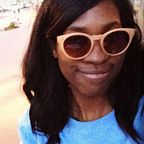What’s good, Medium? Black mental health edition
10/6/2016
Yesterday rapper Kid Cudi took to social media to share a touching letter about his struggles with mental health issues. Talking openly about mental health is still taboo for a lot of Black folks (How many of y’all have heard “Black folks don’t go to therapy, they go to church” at some point in your lives?)
Kid Cudi’s honesty about mental health opened up space for other Black folks to do the same.
Here’s a rundown of Black writers writing about mental health.
Free The Vision uses Kid Cudi to spark a much needed conversation on mental health in Black men:
After reading Kid Cudi’s open letter, I found it imperative to discuss the conflict between black male identity and psychological struggles. On a personal level, I have battled for many years with depression and balancing for as long as I can remember. Despite my outgoing demeanor, my vast experiences of friendship, deep faith, joyous times, creative expression, and any other counteraction to it depression has, and can, linger in the shadows. For black males like myself and Kid Cudi admittance of a struggle has a sense of “weakness” attached to it.
Brianna McCullough gets real on mental health for Black women:
You know that quote that states you have to work TWICE as hard to be considered better than your white colleagues? There is truth to that statement and I have lived it.
From the outside looking in I was NORMAL but on the inside I was dying.Depression and anxiety is not the same for everyone. I never sought therapy I just always figured I was going through growing pains but, it was so much more than that. I just went with the punches, but everyday I felt like I was drowning so deep in an ocean that only I could see. I am naturally an emotional person but I found myself crying everyday and I just didn’t know why. I had everything I had asked for, and to top it off I WAS GRADUATING. I often just felt like, I had NO right to feel these emotions.
For so long, nobody knew of my feelings because in the black community depression and anxiety can be perceived as “weak”, and I did not want to be perceived that way. When you show signs of weakness, people direct you to stay strong. To be black in America you HAVE to be strong.
Orisirisi’s touching tribute:
When going through mental difficulties, please seek help.
There is nothing to be ashamed of.
Just because these illnesses are often unseen does not make them any less serious than those that are seen.
You are brave and worthy of the time and effort you and others will invest in your healing, be it days, months or years. God bless you.
Larry Fellows III opens up about his own family history with depression:
Once my mom left my sister and I a suicide letter, after adjusting to our move to a South Chicago suburb. She garnered a huge promotion and I don’t think she was handling the pressure well, since both my dad and sister decided not to join us. I wasn’t adjusting to the new school either because I missed my friends and my family being apart wasn’t easy. I don’t believe I’ve felt the same since, my father even blamed me for my mother’s attempt. My mother is doing much better and she’s much happier than I’ve seen her in years. Yet those moments of anger, sadness and confusion haunt me even in my adult life.
I made the choice early in my life to stay away from substances thinking I’ll fall victim to abusing them. Doing what I thought was best to be as in control of my life as possible. Despite my ignorance then, I know depression isn’t that simple to control.
Ezinne Ukoha understand’s Kid Cudi’s words on mental health:
Kid Cudi spoke. I understand it. This is the revival that I belong to and embrace. There is no noise. There are bodies angling in protest against the source of their making. My eyes are not open and searching. I don’t need a translator to rescue my misery.
He is safe in his scroll of honesty and acceptance. I read it.
I understand it.
